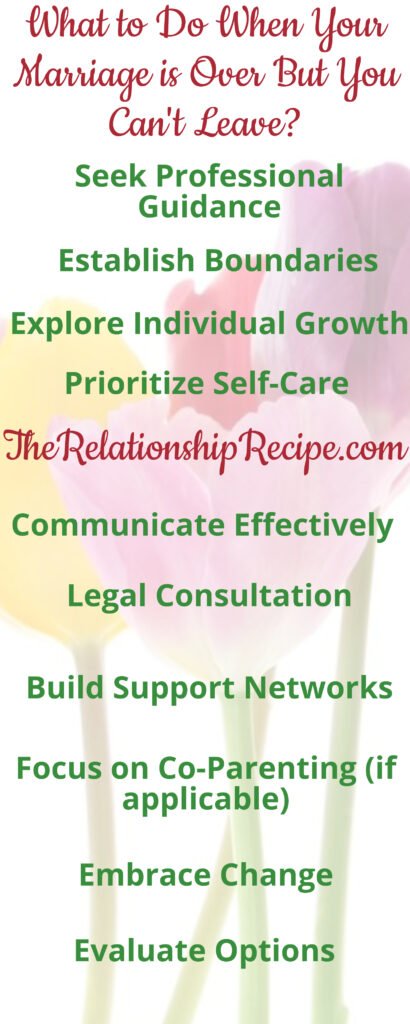When the prospect of immediate departure from a failing marriage seems unattainable, it can be an emotionally taxing and complex experience, no matter what your age or how long you’ve been married.
In these challenging times, you may find yourself at a crossroads, yearning for solutions to navigate the complexities of a relationship that may feel like it’s reached its endpoint.
When Leaving a Failing Marriage Isn’t an Option Right Now
However, in the midst of uncertainty, there are essential steps one can take for personal growth, maintaining emotional well-being, and evaluating the available options. This article explores ten essential aspects to consider when faced with the daunting reality of a failing marriage and the inability to leave right away.
From self-care practices to effective communication strategies, each recommendation aims to provide guidance on the path towards personal resilience and potential transformative outcomes.
I understand that some of these may not be workable – and that some may even be the reason for the separation (Boundaries?? haha) Since relationships are not a “one size fits all” solution, you can take what works for your situation and discard suggestions you may not be able to use.

Here are some considerations for navigating this situation:
1. Seek Professional Guidance
Consulting with a therapist or counselor can provide valuable insights and coping strategies to navigate the emotional challenges of a marriage that feels over.
When faced with a marriage that feels over but unable to leave just yet, seeking professional guidance becomes a crucial step in navigating the emotional complexities. Consulting with a therapist or counselor offers a safe space to unpack and understand the underlying issues contributing to the sense of closure in the relationship.
These professionals provide valuable insights and coping strategies tailored to the unique dynamics of the marriage, fostering a supportive environment to address concerns and explore potential avenues for resolution. Their expertise can empower individuals to navigate the emotional roller coaster, gain clarity on personal needs and desires, and develop a roadmap for the challenging journey ahead.

2. Establish Boundaries
Clearly define and communicate boundaries to ensure that both partners have the space required for personal reflection and emotional processing. In the challenging situation where a marriage feels over, but departure isn’t an immediate option, establishing clear and well-communicated boundaries becomes an essential strategy.
These boundaries serve as a framework to provide both partners with the necessary space for personal reflection and emotional processing. Clearly defining these limits helps manage expectations and reduces potential conflicts, creating a more stable environment for both individuals to navigate the complexities of their emotions.
By setting boundaries, individuals can create a sense of autonomy. This allows each partner the necessary time and space to understand their feelings, assess the situation, and determine the best course of action for their well-being and the future of the relationship.

3. Explore Personal Growth
Use the opportunity to focus on personal growth and self-discovery. This may involve pursuing individual interests, hobbies, or engaging in activities that bring fulfillment.
Amidst the challenging circumstance of a marriage feeling over while not being able to leave immediately, embarking on a journey of individual growth can be transformative. Seize this opportunity to prioritize personal development and self-discovery.
Get into pursuits that resonate with your individual interests, whether it’s exploring new hobbies, embracing creative endeavors, or engaging in activities that bring a deep sense of fulfillment.
This period offers a unique chance to reconnect with oneself, creating a stronger sense of identity and purpose outside the confines of the relationship. By investing time and energy into personal growth, individuals can navigate the emotional complexities with resilience, paving the way for a more empowered and fulfilled life beyond the constraints of the current marital situation.

4. Prioritize Self-Care
Taking care of one’s emotional and physical well-being is crucial during this challenging time. Prioritize self-care activities that promote mental health and overall well-being.
In the midst of a marriage feeling over while the immediate option to leave is not feasible, prioritizing self-care emerges as a crucial component of navigating this challenging period. Focusing on both emotional and physical well-being becomes paramount, emphasizing activities that contribute to mental health and overall wellness.
This may involve establishing a consistent self-care routine that incorporates practices such as mindfulness, meditation, or regular exercise. Prioritizing adequate rest, healthy nutrition, and engaging in activities that bring joy can significantly contribute to building resilience in the face of emotional complexities.
By deliberately nurturing one’s well-being, individuals in this situation can create a foundation of strength, enabling them to cope more effectively with the challenges and uncertainties associated with a marriage that may be reaching its conclusion.

4. Communicate Effectively
If the decision to separate or divorce is not immediate, maintain open and respectful communication to navigate the logistics of the relationship, such as living arrangements and shared responsibilities.
When confronted with a marriage that feels over, but an immediate departure is not possible, effective communication becomes paramount in navigating the intricacies of the relationship. Maintaining open and respectful channels of communication is essential, especially when addressing practical aspects such as living arrangements and shared responsibilities.
Transparent dialogue allows both partners to express their needs and concerns, hopefully creating an environment of understanding and cooperation. Establishing clear boundaries through effective communication helps manage expectations, reducing potential conflicts and creating a more stable foundation for both individuals to navigate the complexities of their evolving relationship.
By keeping open lines of communication, couples in this situation can collaboratively address the logistical aspects while laying the groundwork for a more amicable transition in the future.

6. Get a Legal Consultation
If separation or divorce becomes an inevitable outcome, seeking legal advice early on can help individuals understand their rights and responsibilities. In situations where a marriage is deemed over, yet an immediate departure is not possible, seeking legal consultation becomes a pivotal step for individuals contemplating separation or divorce.
Early engagement with legal professionals offers invaluable insights into the complexities of the legal landscape surrounding marriage dissolution. Understanding one’s rights and responsibilities is crucial in navigating the legal aspects of the impending separation. Legal consultation provides clarity on issues such as asset division, spousal support, and child custody, empowering individuals to make informed decisions about their future.
By taking this proactive approach, we can navigate the legal world with confidence and ensure that our rights are protected as we take on the journey of untangling our lives from a marriage that may be coming to an end.

7. Build Support Networks Around You
Reach out to friends, family, or support groups to build a network of emotional support. Having a strong support system can be instrumental in navigating the complexities of a challenging marriage.
During the challenging period when a marriage feels over, but an immediate departure is not feasible, building support networks becomes a crucial aspect of emotional resilience. Reach out to friends, family, or join support groups to create a robust network that offers understanding and empathy.
Having a strong support system plays a pivotal role in navigating the emotional complexities associated with a strained marriage. These connections provide a safe space to share feelings, gain perspective, and receive guidance. Whether it’s through heartfelt conversations with friends or seeking solace in the understanding of support groups, individuals can find strength and reassurance in knowing they are not alone.
Establishing these supportive connections lays the foundation for emotional well-being and fortitude, enabling individuals to face the challenges of an unraveling marriage with a sense of community and shared strength.

8. Focus on Co-Parenting (if applicable)
If children are involved, prioritize effective co-parenting strategies that consider the well-being of the children while acknowledging the changing dynamics of the family.
In situations where the marriage feels over, but an immediate departure is not feasible, focusing on co-parenting becomes paramount, especially if children are involved. Prioritizing effective co-parenting strategies is essential in navigating the complexities of changing family dynamics.
Ensuring the well-being of the children becomes a shared responsibility, requiring open communication and collaborative decision-making between both parents. Establishing a framework that allows for a positive and supportive co-parenting relationship helps create a stable environment for the children amid the shifting dynamics.
By creating a united front in parenting, individuals can mitigate the potential impact of the strained marriage on their children and contribute to their emotional stability during this transitional period. Effective co-parenting becomes a cornerstone for maintaining a sense of family structure, even as the romantic aspects of the marriage undergo significant changes.

9. Embrace and Accept Inevitable Change
Accept that change is inevitable, and embracing it with resilience can lead to personal growth and the potential for a more fulfilling future. When faced with a marriage that feels over but an immediate departure is not in the near future, embracing change becomes a transformative approach.
If you are not ready to accept change and give certain things up, you are NOT ready to leave yet.
Acknowledging the inevitability of change and choosing to embrace it with resilience opens the door to personal growth and the potential for a more fulfilling future. This involves cultivating a mindset that views change not as a threat, but as an opportunity for renewal and self-discovery. By letting go of resistance and welcoming the shifts in one’s life, individuals can navigate the complexities of an evolving relationship with a sense of empowerment.
Embracing change is an active choice to move forward, letting go of the past and allowing space for new possibilities to emerge. It sets the stage for personal transformation and the creation of a path that aligns with individual aspirations and well-being, even amid the challenges of an uncertain marital situation.

10. Evaluate Your Options
Consider all available options, including therapy, mediation, or legal counsel, to determine the most appropriate path forward for both individuals.
In the complex scenario where a marriage feels over, but an immediate departure is not feasible, it is crucial to meticulously evaluate available options. This process involves a thoughtful consideration of various avenues, such as therapy, mediation, or seeking legal counsel, to determine the most appropriate path forward for both individuals involved.
Therapy can offer a platform for open communication and emotional healing, fostering a deeper understanding of the issues at hand. Mediation provides an opportunity for constructive dialogue and compromise, aiming to find mutually agreeable solutions.
Consulting with legal professionals allows for a clear understanding of legal implications and rights. By thoroughly evaluating these options, individuals can make informed decisions that align with their needs and values, paving the way for a resolution that respects both parties’ well-being and the complexities of the situation.

Navigating a marriage that feels over but unable to leave immediately is undoubtedly challenging, requiring a blend of resilience, self-reflection, and strategic decision-making. It’s essential to prioritize self-care, effective communication, and explore individual growth opportunities during this period of uncertainty.
Seeking professional guidance, whether through therapy, mediation, or legal consultation, can provide valuable insights and support. Establishing boundaries and building a strong support network are crucial elements in maintaining emotional well-being. Whether the ultimate resolution is reconciliation or separation, embracing change and evaluating options with a focus on personal growth and mutual respect is key.
Each step taken, even in the face of marital complexities, contributes to a journey of self-discovery and the potential for a more fulfilling future. Remember, amidst the challenges, there is an opportunity for transformation and the creation of a path that aligns with one’s authentic self and aspirations.
https://romantified.com/unhappy-marriage-but-cant-leave/
This post may contain affiliate links. I earn from qualifying Amazon purchases at no extra cost to you.




